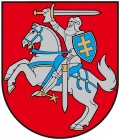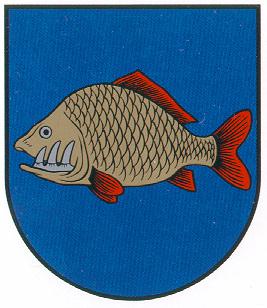Veliuona: Difference between revisions
Knorrepoes (talk | contribs) m (Text replacement - "{|width="100%" style="color:black; background-color:#ffffcc;" |width="15%"|50 px|left |width="70%" align="center" |'''Heraldry of the World<br/>Civic heraldry of Lithuania - Lietuvas Heraldika ''' |width="15%"|50 px|right |}<seo title="herb, herbas, heraldika" />" to "{{lt}}") |
Knorrepoes (talk | contribs) m (Text replacement - "|center]] ====Origin/meaning====" to "|center]] ====Official blazon==== ====Origin/meaning====") |
||
| Line 7: | Line 7: | ||
[[File:veliuona.jpg|center]] | [[File:veliuona.jpg|center]] | ||
====Official blazon==== | |||
====Origin/meaning==== | ====Origin/meaning==== | ||
Revision as of 17:04, 10 January 2016
Lithuania heraldry portal
This page is part of the Lithuania heraldry portal |
Heraldry of the World |
|
Civic heraldry:
|
Other heraldry: |
VELIUONA
County : Tauragė
Municipality : Jurbarkas
Official blazon
Origin/meaning
The arms were officially granted on October 7, 1992.
The exact meaning or origin of the arms is not known. Veliuona received first town rights in the early 16th century and these were confirmed in 1580. As none of the documents still exits, it is not known whether the arms were granted at either of these occasions. No seals are known from the 16-18th century either.
When Veliuona received city rights in 1792 the arms were described as a carp with wolf's fangs, and also that this was the old symbol of the city. The carp is likely a symbol for the Nemunas river, which is rich in fish. The fans are probably derived from the arms of Stephanus Bathory, who had renewed the town rights in 1580. The arms were used until the end of the 18th century and were finally restored after the renewed independence of Lithuania.
Contact and Support
Partners:
Your logo here ?
Contact us
© since 1995, Heraldry of the World, Ralf Hartemink 
Index of the site
Literature : Rimsa, 1998












